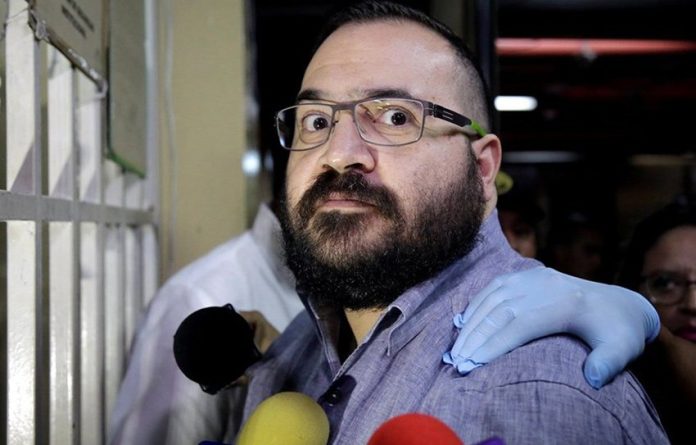The former governor of Veracruz was sentenced in a federal court yesterday to nine years in prison for money laundering and links to organized crime.
Javier Duarte, who governed the Gulf coast state between 2010 and 2016 for the Institutional Revolutionary Party (PRI), pleaded guilty to the charges against him.
The judge also imposed a fine of 58,890 pesos (US $3,125) and ordered the seizure of 41 properties in Veracruz, Campeche, Guerrero and Mexico City.
None of the properties was listed in Duarte’s name but prosecutors contended that they belonged to him and had been acquired with state resources through prestanombres, or front men.
Prosecutors argued that the 45-year-old ex-governor headed a criminal group which conspired to divert funds from the Veracruz government and launder the money through at least 23 shell companies.
According to media reports, the former governor negotiated with the federal Attorney General’s office (PGR) for an abbreviated criminal procedure which allowed him to avoid an oral trial by pleading guilty to the charges against him in advance.
In exchange, the PGR agreed to seek minimum sentences for each crime — both money laundering and organized crime charges have five-year minimums — and cut one year from his sentence.
Duarte appeared in court dressed in a khaki-color prison uniform, sporting a closely-cropped haircut and a long beard, the newspaper Reforma reported.
When asked whether he accepted responsibility for the crimes he was accused of, Duarte responded, “Yes, your honor.”
PGR prosecutors presented 47 pieces of evidence against Duarte including testimonies from former state treasurer Antonio Tarek Abdalá, former state security chief Arturo Bermúdez Zurita, former education official Xóchitl Tress, presumed front men Rafael Gerardo Rosas and Antonio Bandin Ruiz and imprisoned accountant Rafael Nava Soria.
In the testimonies, the aforementioned admitted they had collaborated with Duarte in illicit activities, benefited from them or witnessed some of his crimes.
In accordance with federal law, the ex-governor will be eligible to apply for supervised release once he has served half of his nine-year sentence, Reforma said.
The one year and five months Duarte has already spent in custody — both in Guatemala where he was arrested in April 2017 and Mexico since his extradition in July 2017 — were deducted from his sentence, meaning that he could seek supervised release as soon as October 2021.
The full nine-year sentence will end on April 15, 2026.
The Veracruz Attorney General’s office is also pursuing charges against Duarte, meaning that the ex-governor could face further prison time.
Following his sentencing, Duarte’s lawyer issued a statement saying that his client had pleaded guilty to the charges against him only because it was a requirement of the abbreviated procedure he had negotiated.
Ricardo Antonio Sánchez Reyes Retana also said there is no proof that Duarte committed the crimes he was charged with, adding that he would seek a reduction in the sentence of up to 50%.
Lawlessness spiked in Veracruz during Duarte’s administration and the Federal Auditor’s Office (ASF) said in 2016 that the irregularities in the use of public funds during his governorship were the highest amount it had even seen.
Veracruz state police, including four high-ranking former security officials, have been accused of using death squad tactics to forcibly disappear at least 15 people during the ex-governor’s rule.
Hundreds of bodies have also been recovered from mass hidden graves in the state over the past two years, including more than 170 skulls earlier this month.
Duarte, who had been held up by President Peña Nieto as an exemplar of the new generation of the PRI, took a leave of absence two months before his six-year term was due to end and fled the country.
He was arrested in Panajachel, Guatemala, six months later. His wife, Karime Macías, is believed to be living in London, England.
A report published by Reforma this month said that Duarte and Macías built a multi-million-dollar real estate empire made up of more than 90 properties in Mexico, the United States and Spain.
Source: Reforma (sp), Animal Político (sp), El País (sp)
